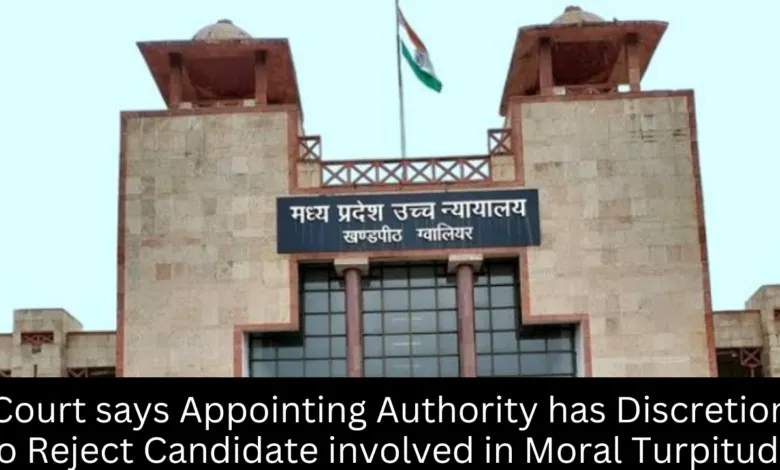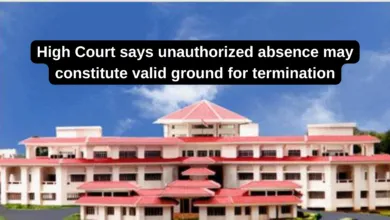Court says Appointing Authority has Discretion to Reject Candidate involved in Moral Turpitude Even if Acquitted

The Madhya Pradesh High Court has ruled that an appointing authority has the full discretion to decide whether to appoint or reject a person involved in an offense related to moral turpitude, even if the person has been acquitted. The court held that acquittal does not automatically entitle an individual to employment.
Court’s Observation
In the case before the court, the appointing authority had provided a fair hearing to the petitioner, who was accused of attempted murder, and its decision to reject the petitioner’s candidacy was upheld. A division bench comprising Justice Sushrut Arvind Dharmadhikari and Justice Anuradha Shukla noted that the respondents adhered to the Supreme Court’s guidelines in the Avatar Singh vs. Union of India & Ors. (2016) case, providing the petitioner with a reasonable opportunity to be heard before issuing a reasoned order.
The bench stated:
“Upon reviewing the order dated 17.04.2023, it is evident that the respondents granted a reasonable opportunity of hearing to the petitioner and issued a reasoned and speaking order in line with the directives in the Avatar Singh case. They explained why the petitioner was not reinstated and rejected the plea for a lesser penalty other than termination.”
Legal Precedent and Discretion of Appointing Authority
The court emphasized that the discretion to appoint or not appoint someone involved in a moral turpitude offense, even if acquitted, lies entirely with the appointing authority. Referring to various Supreme Court rulings, the bench concluded that the disciplinary authority had acted lawfully and had not erred in rejecting the petitioner’s candidature.
Background of the Case
The petitioner was initially appointed as a Casual Labourer in 1982 and later promoted to Technician Grade-II by the respondent University. In 2000, he was convicted under Section 307 of the Indian Penal Code (IPC) for attempted murder and sentenced to three years of rigorous imprisonment along with a fine. Following his conviction, the petitioner was dismissed from service under Rule 9 of the M.P. Civil Services (Classification, Control, and Appeal) Rules, 1965.
The petitioner challenged the conviction in the High Court, which dismissed his plea. He then approached the Supreme Court, which upheld the conviction but reduced the sentence to the time already served. Additionally, the petitioner contested his dismissal from service on the grounds that the principles of natural justice had not been followed.
The High Court initially quashed the dismissal order and directed the disciplinary authority to provide a reasonable opportunity of hearing and issue a reasoned order. The disciplinary authority, after providing a hearing, upheld the dismissal. The petitioner then challenged this decision before the High Court.
Petitioner’s Argument
The petitioner’s counsel argued that the disciplinary authority’s decision to reject the request for a lesser penalty was illegal, arbitrary, and unjust. He further claimed that the authority failed to consider the court’s previous observation that a lesser penalty could be imposed instead of dismissal.
Respondents’ Argument
The respondents’ counsel contended that the petitioner’s dismissal was justified, as he had been convicted under Section 307 of the IPC, which constitutes an offense involving moral turpitude. Citing various Supreme Court judgments, the counsel maintained that the petitioner’s conviction under this section warranted dismissal.
The bench referred to the Supreme Court’s 2013 decision in Commissioner of Police, New Delhi vs. Mehar Singh, which stated:
“A careful perusal of the policy leads us to conclude that the Screening Committee would be entitled to keep persons involved in grave cases of moral turpitude out of the police force even if they are acquitted or discharged on technical grounds.”
Conclusion
The High Court ultimately refused to interfere with the disciplinary authority’s decision and dismissed the petitioner’s plea, affirming that the authority acted within its rights by rejecting the candidature based on the nature of the offense, even though the petitioner had been acquitted.

